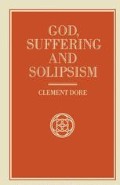Abstract
The supremely perfect being of the last chapter is, of course, identical with the maximally great being of Chapter 1. Hence, the former would be necessarily absolutely great, i.e. no other supremely perfect being is possible.
Access this chapter
Tax calculation will be finalised at checkout
Purchases are for personal use only
Preview
Unable to display preview. Download preview PDF.
Notes
In formulating this explanation, I have drawn on Rowe’s critique of Anselm’s Proslogion II argument in Rowe’s Philosophy of Religion: An Introduction (Belmont, Calif.: Dickenson, 1978) pp. 41–6.
Clement Dore, Theism (Dordrecht: D. Reidel, 1984) p. 98.
Author information
Authors and Affiliations
Copyright information
© 1989 Clement Dore
About this chapter
Cite this chapter
Dore, C. (1989). Parodies. In: God, Suffering and Solipsism. Palgrave Macmillan, London. https://doi.org/10.1007/978-1-349-20047-4_3
Download citation
DOI: https://doi.org/10.1007/978-1-349-20047-4_3
Publisher Name: Palgrave Macmillan, London
Print ISBN: 978-1-349-20049-8
Online ISBN: 978-1-349-20047-4
eBook Packages: Palgrave Religion & Philosophy CollectionPhilosophy and Religion (R0)

